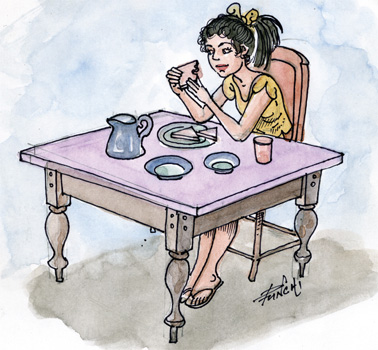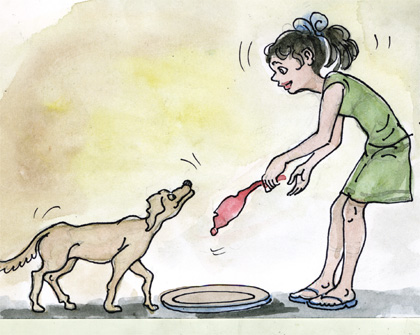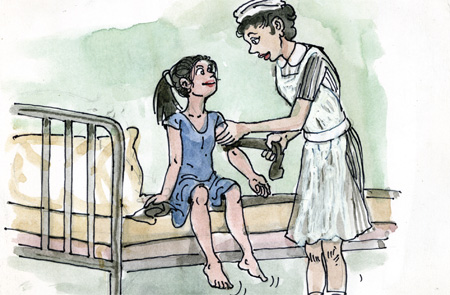|

by R. S. Karunaratne
More about countable and
uncountable nouns
Countable nouns are words such as “chair, book, pen, table” and
“tree.” They are names of things that can be counted. Countable nouns
also include people and animals such as “boy, woman, teacher, monkey,
dog” and “pig.”
 |
|
She ate a slice of bread |
We use indefinite articles (a or an) before countable nouns. ‘An’ is
used before words beginning with a vowel sound.
‘A’ before countable nouns
a camel, a house, a ball, a bat, a girl
‘An’ before countable nouns
an oyster, an egg, an umbrella, an elephant, an hour
Uncountable nouns are words such as “petrol, water, rice, sugar” and
“oil.” They are treated as singular nouns. Here are some more
uncountable nouns.
advice, baggage, bread, furniture, hair, information, knowledge,
luck, luggage, news, travel, work, light
By using a longer expression or a different word we can give
uncountable nouns a countable meaning.
Can you give me a piece of advice?
She ate a slice of bread.
Did you have a good journey?
I drank a glass of water.
Give me a litre of petrol.
We need two kilogrammes of rice for a day.
Add a cup of sugar to the cake mixture.
Mother bought a bottle of coconut oil.
I lost a piece of baggage at the airport.
I need a piece of information about my lost dog.
We had a strange experience yesterday.
He ordered three coffees.
Some words can be countable or uncountable in different contexts.
A light was on in the classroom. (Countable)
 |
|
She gave a piece of meat to the dog.
(Countable) |
Light travels faster than sound. (Uncountable)
I have seen the play three times. (Countable)
Time waits for no one. (Uncountable)
I had a funny experience yesterday. (Countable)
We need an accountant with experience. (Uncountable)
Two teas, please. (Countable)
Tea is good for health. (Uncountable)
She gave a piece of meat to the dog. (Countable)
We do not eat meat. (Uncountable)
The waiter placed a cup of sugar on the table. (Countable)
Too much sugar is bad for health. (Uncountable)
He has a good knowledge of music. ((Countable)
Knowledge is power. (Uncountable)
With a bit of luck you could have passed the examination. (Countable)
I don’t believe in luck.
(Uncountable)
Match words and meanings
Here’s an exciting way to enrich your vocabulary. Match words in
Column ‘A’ with their meanings in Column ‘B’ and check your answers with
the key. The first has been done for you.
[Column A]
P 1. descent
... 2. describe
... 3. descriptive
... 4. desecrate
... 5. desert
... 6. deserter
... 7. desertification
... 8. deserts
... 9. desiccated
... 10. design
... 11. designate
... 12. designation
... 13. desirable
... 14. desire
... 15. desist
... 16. desk job
... 17. desk tidy
... 18. desolate
... 19. despair
... 20. desperado
... 21. desperate
... 22. despicable
... 23. despoil
... 24. despondent
... 25. despot
[Column B]
A. the process by which land changes into desert
B. to want something
C. the feeling that there is no hope
D. someone willing to get involved in criminal activities
E. a job working in an office
F. very serious or bad
G. someone who leaves the Armed Forces without permission
H. describes an unattractive place
I. a container for holding pens and pencils
J. to say what something or someone is like
K. worth having and wanted by most people
L. to choose someone officially to do a particular job
M. an area covered with sand and rock
N. dried
O. what you deserve
P. a downward movement
Q. describing something in a detailed way
R. to stop doing something
S. to make a place less attractive
T. a ruler who has unlimited power
U. unhappy
V. very unpleasant
W. to make plans for something
X. an official title
Y. to show no respect towards something holy or sacred
Key:
2. J 3. Q 4. Y 5. M 6. G 7. A 8. O 9. N 10. W 11. L 12. X 13. K 14. B
15. R 16. E 17. I 18. H 19. C 20. D 21. F 22. V 23. S 24. U 25. T
The order of adjectives
When we use more than one adjective we have to follow a certain
order. The order of adjectives is usually decided by their meaning.
1. Opinion
 |
|
young Indian professor. |
This is a wonderful face cream.
Amanda is a nice young nurse.
He is a great trustworthy leader.
She lives in a grand old bungalow.
A ferocious big dog started barking at us.
2. Size
I want a bundle of large brown envelopes.
A small green box was lying on the table.
We went on a long difficult journey.
A fat old woman greeted us.
The road was long and slippery.
3. Quality
A quiet old man was reading a newspaper.
Oscar Wilde was a famous British author.
We had to answer a difficult question paper.
An angry young man was shouting at a pedestrian.
We sat on a strong wooden bench.
4. Age
A new French novelist won the Booker Prize.
An old British soldier is writing his memoirs.
We visited an ancient royal palace in India.
The minister opened a modern swimming pool.
The chief guest was a young Indian professor.
5. Colour
She bought a black leather handbag.
The ring had a blue precious stone fixed to it.
He was wearing a green silk sari.
The salesman put the shirt into a brown paper bag.
The bird had red flimsy feathers.
6. Origin
A group of Japanese industrial designers visited Sri Lanka.
A team of French fashion designers conducted a workshop.
An Indian archaeology professor has been appointed to the panel.
A Sri Lankan creative writer won the prestigious award.
The tourists visited a German concentration camp used by the Nazi.
7. Material
I bought a steel bread knife.
She wiped herself on a cotton bath towel.
Swapna was dressed in a cotton mini-skirt.
The boy had a plastic ballpoint pen.
We store water in a cement overhead tank.
8. Type
We use an electric steam iron to press clothes.
They use a semi-automatic washing machine.
Father shaves with a battery-operated handy razor.
Manual English typewriters are no longer in vogue.
Hands-free mobile phones are ideal for drivers.
9. Purpose
This is a wonderful new face cream.
I bought a beautiful plastic picture frame.
The shop is selling small ruled writing pads.
The boy was looking for a hard leather cricket ball.
The driver produced a tattered old driving licence.
Quiz on idioms
An idiom is a special kind of phrase. It is a group of words which
have a different meaning when used together from the one it would have
if the meaning of each word were taken individually. Tick the meaning of
each idiom in bold type and check your answers with the key.
1. If someone turns the corner ...
(a) they begin to recover from a difficult situation
(b) they fall into a difficult situation
(c) they begin a new chapter in life
2. If you cut corners ...
(a) you reorganise an establishment
(b) you follow the correct procedure
(c) you save time or money by not following the correct procedure
3. If you count the cost of something ...
(a) you are careful about the expenditure
(b) you consider the extent of the damage
(c) you try to make the maximum profit
4. If you describe someone as a couch potato ...
(a) they spend most of their time watching television
(b) they spend most of their time eating potatoes
(c) they spend most of their time singing
5. If someone does something under the counter ...
(a) they do it profitably
(b) they do it openly
(c) they do it secretly
6. The prime minister has decided to go to the country.
(a) to hold a general election
(b) to dissolve the parliament
(c) to hold a referendum
7. If someone is on course for something ...
(a) they are ready to take action
(b) they are unlikely to succeed
(c) they are likely to achieve it
8. If something takes its course ...
(a) it ends abruptly
(b) it develops gradually and comes to an end naturally
(c) it is destined to fail
9. If you stay the course ...
(a) you fail to do a difficult job
(b) you finish a difficult job
(c) you achieve success
10. If you hold court ...
(a) others will consider you interesting and important
(b) others will not support you in your endeavours
(c) others will suspect you
Key:
1. (a) 2. (c) 3. (b) 4. (a) 5. (c) 6. (a) 7. (c) 8. (b) 9. (b) 10.
(a) |

